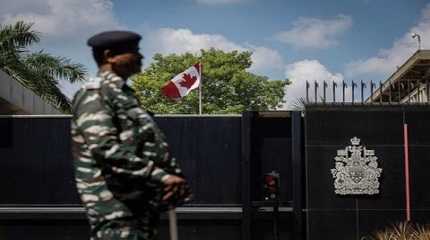
NEW DELHI, Sept 19 (Reuters) - Canadian Prime Minister Justin Trudeau said authorities were "actively pursuing credible allegations" linking New Delhi's agents to the murder of a Sikh separatist leader, an assertion India quickly dismissed as "absurd".
The spat deals a fresh blow to diplomatic ties that have been fraying for years, with New Delhi unhappy over Sikh separatist activity in Canada. It now threatens trade ties too, with talks on a proposed trade deal frozen last week.
Each nation expelled a diplomat in tat-for-tat moves, with Canada throwing out India's top intelligence agent and New Delhi responding by giving a Canadian diplomat five days to leave.
Any involvement of a foreign government in the killing of a Canadian citizen is "an unacceptable violation of our sovereignty", Trudeau told the House of Commons in an emergency statement on Monday.
He was referring to Hardeep Singh Nijjar, 45, shot dead outside a Sikh temple on June 18 in Surrey, a Vancouver suburb with a large Sikh population, three years after India had designated him as a "terrorist".
Nijjar supported creating a Sikh homeland in the form of an independent, so-called state of Khalistan in India's northern state of Punjab, the birthplace of the Sikh religion, which borders Pakistan.
India's foreign ministry did not disclose the name or rank of the Canadian diplomat it had asked to leave the country.
"The decision reflects the government of India's growing concern at the interference of Canadian diplomats in our internal matters and their involvement in anti-India activities," it said in a statement.
The ministry had summoned Cameron MacKay, Canada's high commissioner, or ambassador, in New Delhi to notify him of the move.
ACCUSATION 'COMPLETELY REJECTED'
Earlier, New Delhi urged Ottawa to take action against anti-Indian elements in Canada.
"Allegations of the government of India's involvement in any act of violence in Canada are absurd and motivated," it said, adding that similar accusations made by Trudeau to Prime Minister Narendra Modi had been "completely rejected".
It said the "unsubstantiated allegations" sought to shift focus away from "Khalistani terrorists and extremists who have been provided shelter in Canada".
"We urge the government of Canada to take prompt and effective legal action against all anti-India elements operating from their soil," the ministry said.
Trudeau said he had raised the matter directly with Modi on the sidelines of G20 summit in New Delhi earlier this month, and had urged his government to co-operate with Canada to resolve it.
Modi, in turn, conveyed strong concern to Trudeau over recent demonstrations in Canada by Sikhs calling for an independent state.
Canada has the largest population of Sikhs outside the Indian state of Punjab, with about 770,000 people reporting Sikhism as their religion in the 2021 census.
Khalistan is the name of an independent Sikh state whose creation has been sought for decades. A Sikh insurgency killed tens of thousands of people in India in the 1980s and early 1990s before it was suppressed by tough security action.
New Delhi has been wary of any revival, with a particular focus on small groups of Sikhs in Australia, Britain, Canada and the United States, who support the separatist demand and occasionally stage protests outside its embassies.
The United States and Australia expressed "deep concern" over Canada’s accusations, while Britain said it was in close touch with its Canadian partners about the "serious allegations".
U.S. authorities have urged India to cooperate with the investigation, a senior State Department official said on Tuesday.
Britain will continue trade talks with India despite Ottawa's allegations as London is not looking to conflate negotiations about a trade deal with "other issues", Prime Minister Rishi Sunak's spokesperson told reporters.
'INCREASING STRAIN'
India has been particularly sensitive to Sikh protesters in Canada with some Indian analysts saying Ottawa does not stop them as Sikhs are a politically influential group there.
In June, India criticised Canada for permitting a float in a parade depicting the 1984 assassination of Prime Minister Indira Gandhi by her bodyguards, perceived to be glorification of violence by Sikh separatists.
Ottawa paused talks this month on a proposed trade treaty with India, just three months after both said they aimed to seal an initial deal this year.
Modi did not hold a two-way meeting with Trudeau at the G20 summit, despite similar meetings with other world leaders. Days earlier, metro stations in the Indian capital were vandalised with pro-Khalistan graffiti.
Trudeau's allegations have put ties under increasing strain.
"Three months after the killing, no one has been charged. Nor did Trudeau say who his government believes carried out the killing," independent geopolitical analyst Brahma Chellaney posted on X.
"But his unproven allegation, by sparking tit-for-tat expulsions of diplomats, will likely bring Canada-India relations to a new low."




